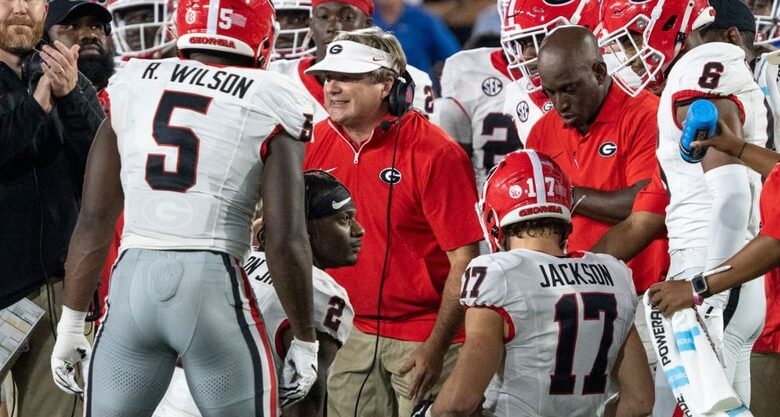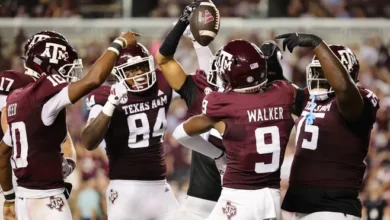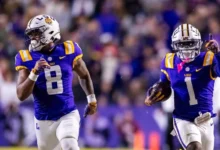Over the past decade, the Georgia Bulldogs have consistently been ranked among college football’s most overrated teams in the AP Poll.

In college football, rankings hold significant weight. They influence perceptions, recruiting, and postseason opportunities. The Associated Press (AP) Poll, in particular, is a primary measure of how teams are viewed nationally each week. Over the past ten seasons, the Georgia Bulldogs have often been listed among the most overrated teams in the AP Poll—a designation that sparks debate, analysis, and reflection on the nature of rankings, expectations, and team performance.
Context: The AP Poll and Its Significance
The AP Poll is a weekly ranking of the top 25 college football teams, voted on by a panel of sports writers and broadcasters. While it provides a snapshot of perceived team strength, it is inherently subjective, influenced by factors such as recent performance, media narratives, historical reputation, and preseason hype.
Being labeled as “overrated” in the AP Poll suggests that a team’s ranking does not accurately reflect its actual on-field performance or competitiveness relative to its perceived stature. For Georgia, a program with a storied history, multiple national championships, and recent success, this perception has been persistent at times, especially when expectations outpace results.
The Rise and Challenges of the Georgia Bulldogs (2010–2023)
Georgia’s football journey over the past decade is marked by significant milestones, including national championships, playoff appearances, and the development of a dominant program under head coaches like Mark Richt and Kirby Smart. However, despite success, the team has also faced criticism, particularly regarding their rankings and perceived overvaluation in the AP Poll.
Early 2010s: Navigating Expectations and Rankings
In the early part of the decade, Georgia often entered seasons ranked highly due to recruiting prowess and historical prestige. However, inconsistent performances and losses to unranked or lower-ranked opponents sometimes led to perceptions that they were overhyped. For instance, in 2012 and 2013, Georgia received top-10 preseason rankings but failed to sustain that momentum, leading some critics to view their high rankings as inflated.
Mid-2010s: Building Momentum but Facing Scrutiny
The hiring of Kirby Smart in 2016 marked a turning point, with Georgia rapidly becoming a national powerhouse. The Bulldogs achieved consistent top-five rankings, SEC dominance, and playoff appearances. Yet, even during this period, some analysts and fans questioned whether Georgia’s lofty rankings accurately reflected their on-field dominance, especially when close games or losses to unranked teams occurred.
For example, in 2018, Georgia was ranked No. 3 entering the season and reached the CFP Championship game. Despite this success, critics argued that their ranking was partly fueled by reputation rather than consistent dominance. This narrative persisted when Georgia was sometimes ranked highly but struggled in key moments, fueling perceptions of overrating.
Why Has Georgia Been Considered Overrated?
Several factors contribute to Georgia’s reputation as an overhyped team in the AP Poll:
- Historical Prestige and Media Hype: Georgia’s rich football history, including multiple national titles and a large, passionate fan base, often leads to high preseason rankings. Media narratives tend to favor established programs, sometimes inflating their perceived strength.
- Performance in Big Games: Critics point out instances where Georgia, despite high rankings, has underperformed in critical games—such as playoff matchups or rivalry contests—leading some to believe their ranking did not match their actual capabilities.
- Close Calls and Unexpected Losses: Occasional losses to unranked or lower-ranked opponents, especially when Georgia was highly ranked, have fueled skepticism. These outcomes suggest that the team’s perceived strength may be overstated.
- Perception vs. Reality: The perception that Georgia is a “blue-blood” program sometimes causes the media and voters to rank them higher than their performance warrants, especially in years where results don’t match expectations.
- Inconsistent Offense or Defense: At times, Georgia has been lauded for strong defense but criticized for inconsistent offense, leading to debates about whether their ranking reflects true dominance or reputation.
The Impact of Being Labeled Overrated
Being viewed as overrated can influence several aspects of a program:
- Expectations and Pressure: High preseason rankings set lofty expectations. When the team underperforms or falters in big games, criticism intensifies, impacting players and coaching staff.
- Recruiting and Public Perception: Rankings influence recruiting pitches and public perception. An overrated label might cast doubt on the team’s true competitiveness, despite recent successes.
- Psychological Effects: Players and coaches may feel pressure to live up to lofty rankings, which can sometimes lead to complacency or anxiety.
- Media and Fan Narratives: The media often scrutinizes teams labeled as overrated, leading to a cycle of skepticism even during successful seasons.
The Counterpoint: Validity of Georgia’s Rankings
Despite criticisms, Georgia’s consistent top-tier performance over the past decade challenges the notion that they are truly overrated. Their multiple SEC championships, playoff appearances, and the national championship victory in 2021 demonstrate that the team has been genuinely elite at times.
Moreover, rankings are inherently subjective and often influenced by intangible factors like team strength, schedule difficulty, and recent results. Georgia’s high rankings often reflect their talent level and the respect they command within college football circles.
The 2023 Perspective and Future Outlook
As of the 2023 season, Georgia remains a powerhouse with a roster loaded with talent and a strong coaching staff. The ongoing debate about whether they are overrated persists, but their recent accomplishments and recruiting success suggest they are truly among college football’s elite.
However, the perception of overrating serves as a reminder for fans and analysts to evaluate teams critically. Rankings should be viewed as snapshots influenced by many factors, not definitive measures of true strength.
Broader Lessons from Georgia’s Overrated Label
Georgia’s experience over the past decade offers broader insights into college football rankings:
- Reputation Can Influence Perception: Established programs often benefit from historical success, which can elevate their rankings regardless of current performance.
- Performance in Key Moments Matters: Consistent success in big games is crucial to justify high rankings and avoid the “overrated” label.
- Rankings Are Not Absolute: They are subjective and fluid, subject to change based on team performance, injuries, and other variables.
- Critical Analysis Is Essential: Fans, media, and voters should balance rankings with in-depth analysis rather than relying solely on reputation or recent results.
Over the past ten seasons, the Georgia Bulldogs have often found themselves labeled as one of college football’s most overrated teams in the AP Poll. This perception stems from a combination of historical prestige, performance in high-stakes games, and occasional underwhelming moments that have contrasted with their lofty rankings.
While Georgia’s accomplishments demonstrate they are a top-tier program, the “overrated” narrative underscores the complexities of college football rankings—how they are shaped, the expectations they generate, and the importance of critical evaluation. As Georgia continues to compete at the highest level, the ongoing debate about their true strength reminds fans and analysts alike of the nuanced and subjective nature of rankings in college football.
Ultimately, Georgia’s story highlights that rankings are tools for gauging perceptions, not definitive judgments of team quality. The program’s future success will depend on consistency, performance in big moments, and the ability to meet or exceed expectations—regardless of whether they are labeled overrated or underrated.









